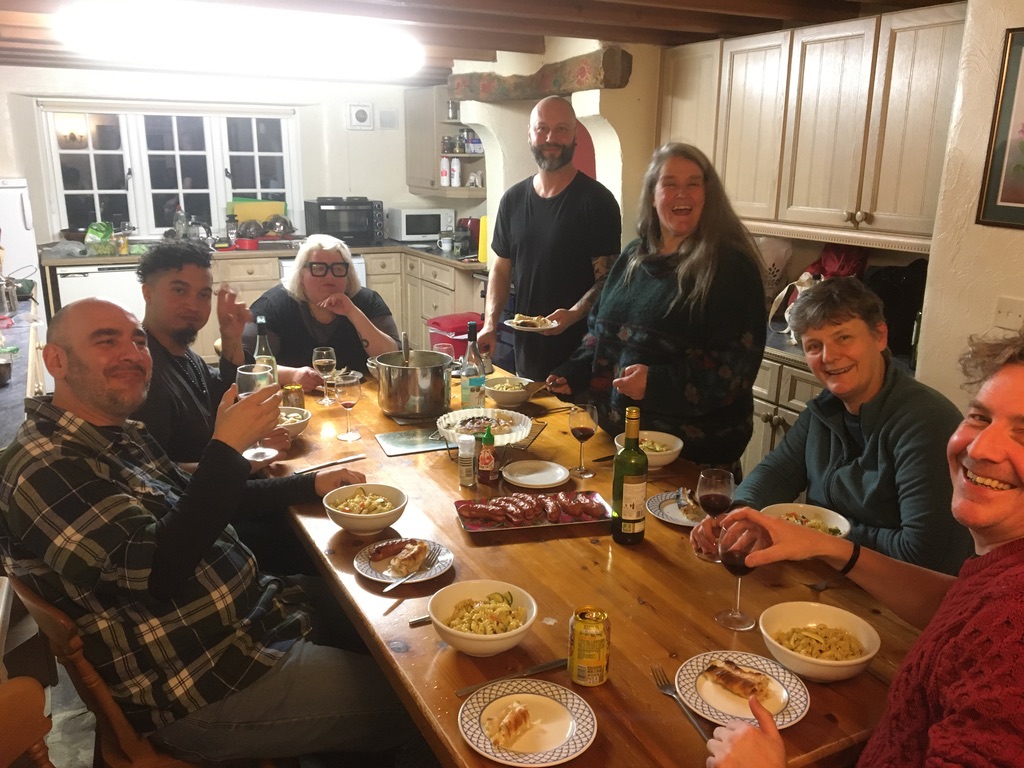Who we are
Steering group: Adam Barker, Emma Battell Lowman, Nicholas Beuret, David Harvie, Amber Huff, Cath Long, Claire Marris
For more information about us, see below.
For more information about us, see below.
Advisory group: Gareth Brown, Jane Charlesworth, Massimo De Angelis, Susan Kelly, Justin Kenrick, Vivian Latinwo-Olajide, Simon Lilley, Jo Littler, Keir Milburn, Dimitris Papadopolous, Martin Parker, Barbara Prainsack, Maria Puig de la Bellacasa, Bert Russell, Leon Sealey-Huggins, Marina Sitrin, Ben Trott and Hendrik Wagenaar


Dr Adam Barker is a geographer known for his research and publication on social justice movements, land-based community building, and the ethics of decolonization in settler societies. His most recent book is Making and Breaking Settler Space: Five Centuries of Colonization in North America (UBC Press, 2022), which argues for affinity-based and community-driven efforts to support Indigenous resurgence. He is the co-author, with Dr Emma Battell Lowman, of Settler: Colonialism and Identity in 21st Century Canada (2015), which has been recognized for spurring public engagement with settler colonial legacies and decolonization.

Dr Emma Battell Lowman is an educator, facilitator, and internationally recognized scholar of decolonization, colonial and imperial histories, and education. She is an experienced trade unionist, lecturer, researcher, and project manager who brings her passion for radically inclusive and transformative lifelong education to her work with inCommons.

Dr Nicholas Beuret is an interdisciplinary researcher and lecturer, working around the problems of ecological crises, climate migration and adaption, and just transitions, as well as an experienced social-movement and environmental activist, and trade union organizer. He has published extensively on the commons and related questions of political ecology for a wide range of audiences. Recently, he co-edited Commoning with George Caffentzis and Silvia Federici (Pluto 2019), published on the way imagination effects environmental politics (in Environment and Planning E), and authored numerous short pieces on contemporary environmental politics in The Ecologist and Novara Media. Nicholas is active in a number of political and activist research projects, including projects on net zero profiteering and climate migration; he is heavily involved in local union organizing at his employer, the University of Essex. He is a co-editor of the website Uneven Earth, a board member of the activist educational project Common Ecologies.

Dr David Harvie was until 2021 employed by University of Leicester as associate professor of finance and political economy; he is now a deprofessionalized intellectual. He has published widely on commons (most recently co-editing Commoning with George Caffentzis and Silvia Federici, Pluto 2019), finance, social movements and Marxian political economy. David has extensive experience as a social-movement activist, trade union organizer and communicator. He was an editor of Turbulence: Ideas for Movement. He lives in Leeds. More information on David’s education, experience and publications here .

Dr Amber Huff is a social anthropologist and political ecologist. She is a Senior Research Fellow at the Institute of Development Studies (IDS), UK, where she is director of the Future Natures initiative and co-leader of the Resource Politics and Environmental Change Research Cluster. For 15 years, Amber has worked with members of local communities in Madagascar and southern and East Africa to learn about natural resource governance and the politics of resource enclosure. She has worked in solidarity with people’s struggles for environmental justice, democratic autonomy and ecological defence in sub-Saharan Africa, the Middle East and Europe.

Dr Catherine Long is an ecologist, artist and facilitator. She has three decades’ experience working with community-led and indigenous people-led projects and campaigns in Europe, Africa and Latin America.

Dr Claire Marris was an academic in Science and Technology Studies until her retirement in 2021. Her research, focused on interconnections between biosciences and society, especially in the area of food and agriculture, was widely published in academic journals as well as publications aimed at policy makers (details here). Claire has been involved as an actor and researcher in controversies around the use of genetically modified organisms in agriculture since the mid 1990s, including comparing activist responses in the USA and different European countries and related commoning approaches around renewed visions of peasant farming. She is an active trade unionist and was an elected member of the National Executive Committee of the University and College Union (UCU) in 2019-2021.

